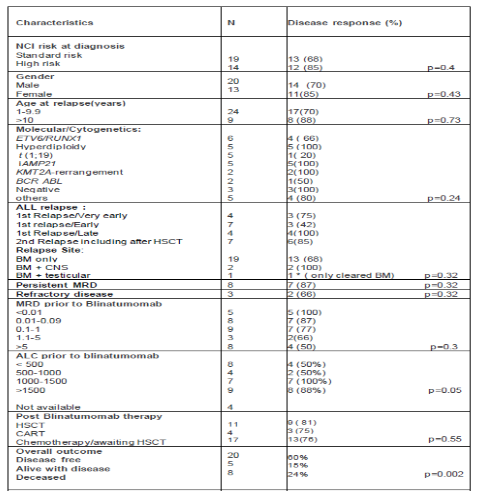
Contributions
Abstract: EP369
Type: E-Poster Presentation
Session title: Acute lymphoblastic leukemia - Clinical
Background
The management of Refractory/Relapsed B cell Acute Lymphoblastic Leukemia (R/R ALL) is still challenging. The use of Blinatumomab in such patients is an option with encouraging results.
Aims
To study the outcome of pediatric patients with R/R ALL or persistent Minimal Residual Disease (MRD) in three centers and correlate their outcome with MRD level, Cytogenetics and Absolute Lymphocyte Count(ALC) prior to Blinatumomab therapy.
Methods
A total of 33 patients with R/R ALL or persistent Minimal Residual Disease (MRD) in three different centers who received Blinatumomab therapy.Their outcome was studied based on MRD level, Cytogenetics and Absolute Lymphocyte Count(ALC) prior to Blinatumomab therapy.MRD measurement was done using flowcytometry method. Results were described and associaction analysis was done using chi-square and Fisher's tests.
Results
Clinical characteristics and outcome are demonstrated in Table attached. Complete remission (CR) with MRD <0.01 after one or two cycles was achieved in 25 patients then proceeded with other assigned treatment. 20 patients (60%) remained alive without disease recurrence. MRD levels, cytogenetics abnormalities and Absolute Lymphocyte Count (ALC) prior to Blinatumomab therapy in relation to disease response are shown in Table. In addition, patients with t(1,19) had worse outcome compared to other cytogenetic abnormalities.Follow-up duration was (0.4–5) years.

Conclusion
Blinatumomab therapy was associated with excellent response especially in ALL patients with positive MRD. MRD level <0.1% and Absolute Lymphocyte Count (ALC) > 1000/ul prior to Blinatumomab therapy were associated with better outcome. Large prospective studies are ongoing to study Blinatumomab upfront therapy in pediatric ALL patients with persistent MRD.
Keyword(s): Absolute lymphocyte count, ALL, Immunotherapy, Pediatric
Abstract: EP369
Type: E-Poster Presentation
Session title: Acute lymphoblastic leukemia - Clinical
Background
The management of Refractory/Relapsed B cell Acute Lymphoblastic Leukemia (R/R ALL) is still challenging. The use of Blinatumomab in such patients is an option with encouraging results.
Aims
To study the outcome of pediatric patients with R/R ALL or persistent Minimal Residual Disease (MRD) in three centers and correlate their outcome with MRD level, Cytogenetics and Absolute Lymphocyte Count(ALC) prior to Blinatumomab therapy.
Methods
A total of 33 patients with R/R ALL or persistent Minimal Residual Disease (MRD) in three different centers who received Blinatumomab therapy.Their outcome was studied based on MRD level, Cytogenetics and Absolute Lymphocyte Count(ALC) prior to Blinatumomab therapy.MRD measurement was done using flowcytometry method. Results were described and associaction analysis was done using chi-square and Fisher's tests.
Results
Clinical characteristics and outcome are demonstrated in Table attached. Complete remission (CR) with MRD <0.01 after one or two cycles was achieved in 25 patients then proceeded with other assigned treatment. 20 patients (60%) remained alive without disease recurrence. MRD levels, cytogenetics abnormalities and Absolute Lymphocyte Count (ALC) prior to Blinatumomab therapy in relation to disease response are shown in Table. In addition, patients with t(1,19) had worse outcome compared to other cytogenetic abnormalities.Follow-up duration was (0.4–5) years.

Conclusion
Blinatumomab therapy was associated with excellent response especially in ALL patients with positive MRD. MRD level <0.1% and Absolute Lymphocyte Count (ALC) > 1000/ul prior to Blinatumomab therapy were associated with better outcome. Large prospective studies are ongoing to study Blinatumomab upfront therapy in pediatric ALL patients with persistent MRD.
Keyword(s): Absolute lymphocyte count, ALL, Immunotherapy, Pediatric


